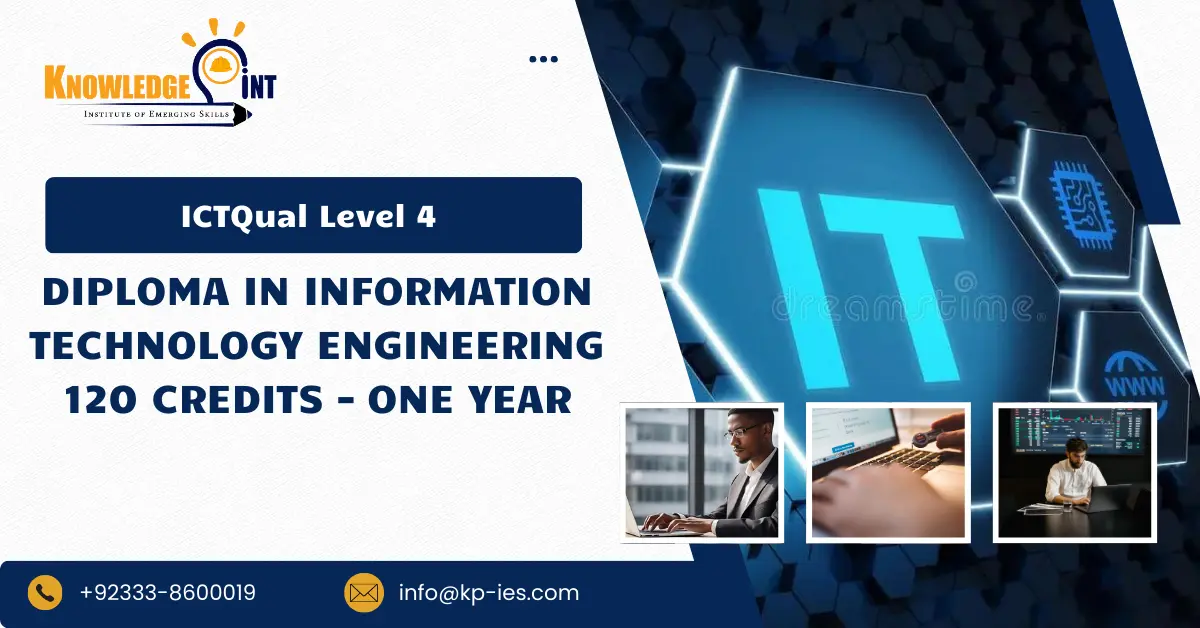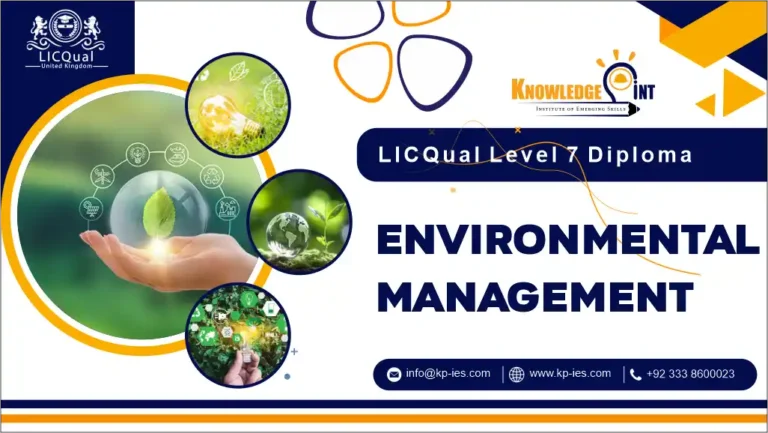In today’s rapidly evolving technological landscape, the demand for skilled professionals in Information Technology (IT) continues to grow. For individuals looking to make their mark in IT engineering, the ICTQual Level 4 Diploma in Information Technology Engineering (120 Credits – One Year) offers an ideal foundation. This one-year qualification provides students with essential knowledge and practical skills in various core areas of IT, preparing them for a range of career opportunities or further academic progression.
The ICTQual Level 4 Diploma in IT Engineering is designed for individuals who are eager to gain a solid understanding of IT principles and practices. This qualification focuses on both theoretical knowledge and practical skills, ensuring that students are well-prepared for real-world IT challenges. The program is ideal for those wishing to build a strong technical foundation and enter the workforce in a junior or support role in the IT sector.
The ICTQual Level 4 Diploma in Information Technology Engineering is a comprehensive and accessible qualification that provides students with the foundational skills needed for a successful career in IT engineering. Whether you are looking to start working in IT, pursue further education, or gain industry certifications, this diploma offers a versatile pathway to a wide range of opportunities. With its practical approach, diverse curriculum, and career-focused outcomes, the ICTQual Level 4 Diploma is the first step toward a promising and rewarding career in the dynamic world of Information Technology.
Course Overview
The ICTQual Level 4 Diploma in Information Technology Engineering 120 Credits – One Year consists of 12 mandatory units which are as follows.
- Fundamentals of IT Engineering
- Network Management and Administration
- Cybersecurity and Data Protection
- Systems Design and Software Development
- Database Management and Development
- Cloud Computing and Virtualization
- Advanced Network Security
- IT Project Management
- IT Infrastructure and Systems Management
- Business IT Solutions
- Emerging Technologies in IT
- Professional Practice in IT Engineering
The future progression of the ICTQual Level 4 Diploma in Information Technology Engineering 120 Credits – One Year can lead learners towards several pathways, depending on their career goals and aspirations in the field of law and related sectors. Here are some potential avenues of progression:
1. Fundamentals of IT Engineering
- Understand core IT engineering principles and their applications in real-world systems.
- Demonstrate the ability to design and troubleshoot basic IT systems.
2. Network Management and Administration
- Configure and manage network devices and services.
- Implement network security measures and resolve common network issues.
3. Cybersecurity and Data Protection
- Identify cybersecurity threats and apply protective measures.
- Ensure data security through encryption, authentication, and secure protocols.
4. Systems Design and Software Development
- Design and develop efficient software solutions.
- Apply the software development life cycle to create and test applications.
5. Database Management and Development
- Design and implement relational databases using SQL.
- Manage data integrity, security, and perform complex queries.
6. Cloud Computing and Virtualization
- Understand cloud computing models and manage virtualized environments.
- Implement cloud security measures and optimize resources for cost-efficiency.
7. Advanced Network Security
- Design and implement advanced security measures for networks.
- Monitor and mitigate network threats using security protocols and tools.
8. IT Project Management
- Plan, execute, and monitor IT projects using standard methodologies.
- Manage project risks, budgets, and timelines effectively.
9. IT Infrastructure and Systems Management
- Manage IT infrastructures for optimal performance, reliability, and scalability.
- Implement disaster recovery and backup strategies to ensure system continuity.
10. Business IT Solutions
- Design and implement IT solutions to address business needs.
- Integrate business applications like ERP and CRM to improve organizational performance.
11. Emerging Technologies in IT
- Identify and evaluate emerging technologies impacting IT systems.
- Apply new technologies to innovate and enhance IT solutions.
12. Professional Practice in IT Engineering
- Demonstrate ethical professionalism and industry standards in IT practice.
- Engage in continuous professional development and improve personal practice.
Course Benefits of the ICTQual Level 4 Diploma in Information Technology Engineering 120 Credits – One Year :
- Comprehensive Skill Development
The course covers a wide range of foundational IT engineering topics, equipping students with both theoretical knowledge and practical skills in network management, systems design, cybersecurity, and more. - Industry-Relevant Knowledge
The curriculum is designed to address the current needs of the IT industry, ensuring that students are prepared to meet the challenges and demands of modern IT engineering environments. - Hands-On Experience
Students gain practical experience in areas like network administration, cybersecurity, database management, and cloud computing, preparing them to implement solutions in real-world settings. - Career Advancement Opportunities
This qualification opens the door to a variety of career paths in IT engineering, including roles such as IT Support Engineer, Network Administrator, Systems Analyst, and Cybersecurity Specialist. - Preparation for Further Study
The course serves as a strong foundation for students considering further academic or professional development, including progression to higher-level diplomas or degree programs. - Focus on Emerging Technologies
The inclusion of emerging technologies like cloud computing, data protection, and virtualization ensures that students are well-versed in the latest trends and innovations in IT. - Industry-Recognized Qualification
The ICTQual Level 4 Diploma is widely recognized by employers and educational institutions, adding significant value to your resume and career prospects. - Professional Practice
Emphasis on professional ethics and industry standards prepares students to work responsibly and effectively in IT engineering roles, aligning with best practices in the field. - Project Management Skills
The course integrates IT project management, allowing students to develop skills in planning, executing, and managing IT projects, a key asset in many IT roles. - Problem-Solving and Critical Thinking
Students develop strong problem-solving and analytical skills, essential for tackling complex IT challenges and optimizing system performance. - Flexible Career Pathways
With expertise in a variety of IT domains, graduates can pursue diverse career opportunities across industries, from tech startups to large corporations, in roles such as network manager, systems administrator, IT consultant, and more. - Global Career Prospects
The skills and knowledge gained in this program are transferable globally, opening up international job opportunities in the ever-expanding IT sector.
Graduates of the ICTQual Level 4 Diploma in Information Technology Engineering (120 Credits – One Year) have several exciting pathways for further academic and professional growth. The knowledge and skills gained from this qualification provide a solid foundation for further studies and a successful career in IT engineering. Below are some potential future progression options:
1. Higher Education Progression
- ICTQual Level 5 Diploma in Information Technology Engineering
The next logical step after completing the Level 4 Diploma is to pursue a Level 5 qualification. This would further deepen technical knowledge and skills in IT systems, network management, and software development, setting the stage for more specialized career roles in the IT field. - Bachelor’s Degree in Information Technology or Computer Science
Many students choose to progress to a bachelor’s degree in IT, computer science, or a related field. The Level 4 Diploma provides a strong foundation for entry into higher education, and students can often gain advanced standing or credit transfers to shorten their time in a degree program.
2. Professional Certifications and Industry Specialization
- Certified Network Engineer (CNE)
For those interested in network management, obtaining certifications such as CompTIA Network+, Cisco Certified Network Associate (CCNA), or Certified Information Systems Security Professional (CISSP) can significantly enhance career prospects. These certifications align with real-world industry standards and provide a more specialized focus on network security, data protection, and IT infrastructure management. - Cybersecurity Certifications
With the growing demand for cybersecurity professionals, graduates can pursue certifications like Certified Ethical Hacker (CEH), Certified Information Security Manager (CISM), or Certified Information Systems Auditor (CISA). These certifications will expand expertise in securing IT systems and mitigating cyber threats. - Cloud Computing and Virtualization Certifications
As cloud computing continues to be a key focus in IT, earning certifications like Amazon Web Services (AWS) Certified Solutions Architect, Microsoft Certified: Azure Solutions Architect, or VMware Certified Professional (VCP) can open doors to roles in cloud infrastructure management and IT service delivery.
3. Career Advancement Opportunities
- IT Support Specialist or Network Administrator
The skills gained from the Level 4 Diploma provide immediate entry into the workforce. Graduates can take on roles such as IT support specialist, systems administrator, network administrator, or IT helpdesk technician. As they gain experience, they can progress to more senior positions like IT consultant, solutions architect, or IT infrastructure manager. - IT Project Manager
For those interested in overseeing IT projects, the combination of technical knowledge and project management skills gained from the course can lead to roles in IT project management. Graduates can pursue certifications like Project Management Professional (PMP) or Agile Certified Practitioner (ACP) to increase their qualifications and career prospects in project management.
4. Entrepreneurial Ventures
- IT Consultancy and Freelancing
With the rapidly evolving nature of IT, many graduates opt to start their own IT consultancy businesses or work as freelancers, providing network management, system design, and cybersecurity services to clients. The broad skill set obtained from the Level 4 Diploma prepares graduates for entrepreneurship in the tech industry.
5. Industry-Specific Roles
- E-Commerce and Business IT Solutions
The course’s focus on IT business solutions, emerging technologies, and cloud computing makes graduates well-positioned for roles in the growing fields of e-commerce and IT business solutions. Graduates can pursue roles in IT systems integration for e-commerce platforms or enterprise resource planning (ERP) systems for businesses. - Data Analyst/AI Specialist
For those interested in data and artificial intelligence, further specialization in data analytics, AI, or machine learning can lead to roles like data analyst, data engineer, or AI systems developer. Graduates may pursue further studies or certifications in data science and AI technologies.
6. Professional Development and Lifelong Learning
- Continuous Learning
IT is a rapidly changing field, and lifelong learning is key to remaining competitive. Graduates of the Level 4 Diploma can engage in continuous professional development by attending workshops, online courses, or industry conferences to stay updated on the latest technological advancements.







